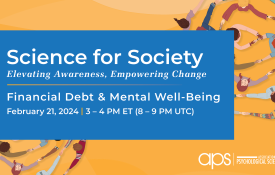-

New Content From Current Directions in Psychological Science
A sample of articles on the psychology of erectile dysfunction, STEM engagement in informal learning environments, leveraging decision science, rethinking attentional habits, and much more.
-
A Paradigm Shift in How Scientists Study Kids
There is an open secret in the study of child development: Most of what we think we know about how babies develop is actually based on a specific subset of kids—those born to families from Western, educated, industrialized, rich, and democratic (a.k.a. WEIRD) nations. The acronym was first coined in an influential 2010 paper to describe the wildly unrepresentative populations that many psychology studies have long relied on.
-
People Have Very Different Understandings of Even the Simplest Words
In 2017Kris De Meyer, a neuroscientist who directs the Climate Action Unit at University College London, ran the opening session of a conference on decision-making under uncertainty for an audience of scientists, finance professionals and policy makers. He divided them into groups of six and gave them questions and activities centered on their personal and professional experiences of risk. After a while, some hands went up. “They said, ‘We just realized we cannot agree on the definitions of risk and uncertainty,’” De Meyer says.
-

New Content From Perspectives on Psychological Science
A sample of research on intergroup attitudes, social drivers on digital media, the conversational silencing of racism in psychological science, what makes a group emotional, and much more.
-

Spending, Saving, and Owing: How Finances Intersect with Behavior and Emotions
In a February Science for Society webinar, a panel of experts discussed the impact of financial debt on psychological well-being, the link between spending habits and happiness, and much more.
-
For Gen Z, an Age-Old Question: Who Pays for Dates?
During a recent dinner at a cozy bar in Upper Manhattan, I was confronted with an age-old question about gender norms. Over bowls of ramen and sips of gin cocktails, my date and I got into a debate: Who should pay for dates? My date, a 27-year-old woman I matched with on Hinge, said gender equality didn’t mean men and women should pay the same when they went out. Women, she said, earn less than men in the workplace, spend more time getting ready for outings and pay more for reproductive care. When the date ended, we split the bill. But our discussion was emblematic of a tension in modern dating.

